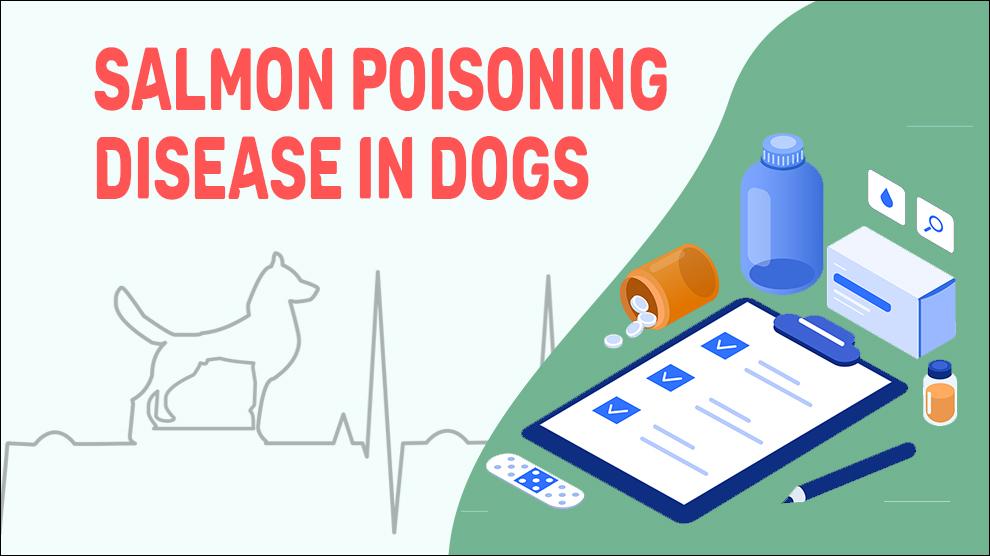What Is Salmon Poisoning Disease In Dogs?
Salmon poisoning disease (SPD) is an acute, neorickettsial, vector-borne infection found in the pacific northwest (widespread from Northern California up to Canada, Vancouver Island). This is caused when dogs ingest anadromous fishes (fishes that swim upstream to breed such as salmon, raw trout, etc) that inhabit the coastal streams and rivers.
When dogs ingest fishes infected with parasitic flukes or flatworms that have rickettsial bacteria such as Neorickettsia helminthoeca rickettsial organism, they attach to the dog’s intestinal mucosa and then disseminate to other organs such as lung, liver, spleen, etc. The rickettsial agent (N. helminthoeca) is present right through the trematode’s growth cycle and does not harm the trematode.
When a dog consumes a raw, parasitized fish infected with fluke metacercariae, the flukes develop and attach to the dog's intestinal mucosa within 5 to 7 days, in this manner inoculating the N. helminthoeca pathogens. Neorickettsia infects the mononuclear cells and intestinal epithelium and then circulates to the MPS organs- mononuclear phagocyte system (e.g., liver lymph nodes, spleen, etc), and to other areas such as the lungs and CNS.
A comparable, however, less severe infection known as Elokomin fluke fever is caused by a related, (not yet named) pathogen that is transmitted by the same fluke. Soon after mucosal infestation. salmincola and the organisms, Rickettsemia occurs and spread to lymphoid tissues and other organs. Fleshy and Inflated visceral lymph nodes with regions of necrosis and hemorrhage, noticeable splenomegaly with white follicles, peritonitis with hepatic rupture, hemorrhage in the urinary as well as gall bladders, and intussusception of the small intestine are also observed.
Symptoms Of Salmon Poisoning Disease In Dogs
- Abdominal pain
- Acute hemorrhagic diarrhea
- Loss of weight
- Tiredness
- Excessive thirst
- Excessive urination
- Coughing or difficulty breathing
- Bloody mucus
- Pneumonia
- Discharge from the eyes and/or nose
- Bronchiectasis (the bronchioles damage)
- Lethargy
Treatment Options For Salmon Poisoning Disease In Dogs
Intestinal parasitic medications: Praziquantel, Fenbendazole, Nitroscanate and Epsiprantel.
Medications: Tetracycline (20 mg/kg q8h PO for 21 days), Doxycycline (8 to 12 mg/kg q12h PO --- IV for 20 days) for the bacterial infection or praziquantel (20 to 30 mg/kg, one dose PO or SC).
Home Remedies For Salmon Poisoning Disease In Dogs
- Keep an eye on your dog's bowel movements, look into the severity of the condition and figure out whether the issue escalates or resolves.
- Contact your vet right away for an increased frequency of diarrhea in a short time period.
- As the dog requires minimal digestion for a day or two, introduce a bland diet and feed little white meat such as chicken and cooked white rice.
- Feeding small quantities every 3-4 hours is good for dogs with SPD.
- Regular food can be slowly re-introduced when your dog is feeling good.
How To Prevent Salmon Poisoning Disease In Dogs?
- When you take your dog for walks, keep them away from water bodies and swampy areas in the woods.
- Keep your backyard clean. Fight your corner by weeding, mowing, or trimming the bushes near your house.
- It is always good to keep the lawn manicured.
- Always provide your dogs with high-quality seafood.
Affected Dog Breeds Of Salmon Poisoning Disease
There is no breed disposition
Causes And Types For Salmon Poisoning Disease In Dogs
1. Causes:
- Larvae Transmission from intermediate hosts to dogs
- Transport of eggs in polluted water
- When dogs eat fishes infected with microorganism neorickettsia helminthoeca, they are affected by SPD
- Fishes like salmon, large-scale sucker, trout, sturgeon, shad, sculpin, redside shiner, lamprey, or candlefish
2. Types:
Flukes:
Neorickettsia helminthoeca- causes salmon poisoning disease
Neorickettsia elokominica- causes less severe Elokomin fluke fever
3. Morbidity:
- Herding and hunting dogs in the endemic region of the Pacific Northwest are at higher risk.
- The incubation period: is 5 - 21 days.
4. Mortality:
Untreated SPD has a high mortality rate in dogs. In the case of disseminated SPD, the mortality rate tends to be higher.
5. Diagnosis:
- Stool sample for testing
- Blood and urine cultures
- Specific blood tests
- X-rays, ultrasound, or CT scan
6. Prognosis:
The prognosis for SPD is really good. When provided with appropriate treatment, the dogs will recover within a few weeks. If left untreated, severe cases of flukes can be fatal for dogs, so head to your vet immediately.
When To See A Vet For Salmon Poisoning Disease In Dogs?
It’s better to set up an appointment with your veterinarian if you notice-
- Abdominal pain
- Acute hemorrhagic diarrhea
- Loss of weight
Food Suggestions For Salmon Poisoning Disease In Dogs
- Boiled chicken / wet dog food or Meat-flavored bland food / Chicken baby food / Lean boiled meats
- Probiotics (yogurt, fermented vegetables, Goat's Milk, kefir with live cultures)
- Shredded chicken with Bone Broth Gravy
- Chicken soup bone broth (or use lamb/beef bones)
- Organ meat, Grass-Fed Meat, beef liver
- Green vegetables (cauliflower, cabbage, cantaloupe, Brussel sprouts, spinach, Kale, and silver beets)
Conclusion
The prognosis for SPD is really good. Most dogs undergoing treatment will recover within a few weeks. If left untreated, SPD can be fatal for dogs, especially for puppies, so head to your vet immediately.

















